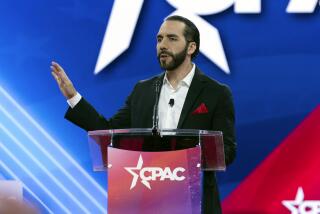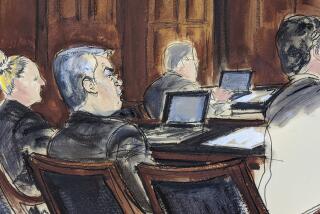Early results show conservative ahead in Honduras
TEGUCIGALPA, Honduras — Juan Orlando Hernandez, candidate of the conservative ruling National Party, took an early lead in Honduras’ presidential election Sunday, a vote overshadowed by deadly violence, endemic poverty and the lingering devastation of a military coup.
With 43% of the vote counted, the national election board said Hernandez had 34% to slightly less than 28.5% for Xiomara Castro, but cautioned that the results were preliminary. Castro is the founder of a new pro-left party and the wife of the president ousted in a 2009 coup.
Both candidates claimed victory.
Honduras has been mired in political and economic crisis for years, propelling more people to flee to the United States. The nation has one of the highest homicide rates in the hemisphere and has emerged as the principal transshipment point in the region for cocaine to the U.S.
The election comes amid a wave of violence in which candidates, judges and journalists were slain. Regardless of who wins, if the vote is close, the next president is not likely to have a strong mandate, and Honduras could remain practically ungovernable. Although there will be new voices in Congress, it will be a divided and polarized body, a difficult venue for policy agreements.
For some in the tight circle of elite business and political forces who control Honduras, gridlock suits them just fine because they oppose any significant change in the way things are run in Latin America’s poorest country.
“Political consensus will be very difficult for whoever wins,” said Julieta Castellanos, rector of the National Autonomous University of Honduras. The elites “will not accept innovative reforms … and are fine with democracy only as long as their interests are served.”
Voters spoke of the need for change, but there was wide disagreement on who could best achieve it and how it might be done.
Mayra Valladares, a 66-year-old homemaker, said she cast her ballot for Hernandez because he would be the toughest on crime.
“He works with an iron fist, and that’s what we need,” said Valladares, whose two nephews were slain last year.
First-time voter Sarahy Suazo, 18, agreed. “We need the military in the streets where they can stop crime, not in their barracks,” she said, adding that she was confident the National Party would help her get a job.
Hernandez, until recently president of Congress, created a military police force to combat Honduras’ runaway homicide rate. The effort won praise in some sectors but was widely condemned by human rights organizations and pro-democracy groups. He has also been heavy-handed in stacking many of Honduras’ notoriously corrupt institutions with his supporters and spreading what many here describe as a generalized climate of fear.
“The crisis in Honduras is of unprecedented proportions, and has turned us into a failed state,” said Jose Ochoa y Martinez, 71, after voting at a school near the central market in downtown Tegucigalpa. “Parts of Honduras are practically feudal and whatever we do today won’t change things, our reality is so dramatic.”
Still, the retired television broadcaster said he was voting for Castro as the beginning of hope for change.
Castro’s husband, Manuel Zelaya, was ousted in the coup after he threatened to change the constitution; he was taken from his home in his pajamas and put on a flight to Costa Rica.
Jorge Mendez was having none of Sunday’s election. The out-of-work former police officer said he was sick of all politicians and would not vote. “It’s all lies,” he said. “Juan Orlando didn’t solve any problems while he was head of Congress, and Xiomara may have good intentions but the powerful families who control Honduras won’t let her govern.”
Honduras has been dominated by two parties, the National and the Liberal, often in cahoots with the military, for most of its political history. This is the first election with a formidable opposition, Castro’s Free Party, along with an array of smaller groups, all fielding hundreds of candidates for the legislature and city halls.
“People are out and voting massively, despite all the fear everyone had,” Castro told reporters earlier in the day, just before marking her ballot, Zelaya at her side. Her critics contend she is just a front for the controversial former president.
Although the Liberal Party’s candidate, Mauricio Villeda, lagged, he won Gloria Becerra’s vote. “He’s the most honest of the lot,” said the 78-year-old homemaker, who bore a bruise on her face from a mugging two days earlier. The attacker knocked her to the ground and stole her purse. “I battled and battled but he finally got it,” she said. He made off with the equivalent of $25.
The partial, preliminary results had Villeda in third place.
At voting stations in the wealthier enclaves of Tegucigalpa, where houses sit behind high walls and bodyguards whisper into their radios while their bosses cast ballots, there was even support for one of the more unlikely candidates, Romeo Vasquez, the former army general who helped stage the coup.
“People want change, and I am completely fed up with the politicians,” said Carlos Rodriguez, 63, an agronomist and evangelical preacher dressed in a robin’s-egg blue sports shirt with a “Beverly Hills Polo Club” logo. “So I’m voting for the general, not so much because he is a military man but because he is not a politician.”
Numerous irregularities were reported nationwide, including vote-buying, paperwork foul-ups, intimidation and the wounding of two Free Party polling station workers.
There has been widespread concern that if the results in the presidential race are extremely close, or if the vote is seen as unfair, a wave of violence could follow that would throw the country into even greater turmoil.
“Our biggest fear has been that the results will be disputed and passions will overflow into the streets,” said Jennifer McCoy, head of the Americas division of the Carter Center, one of dozens of groups here to monitor the election.
With competing victory claims Sunday evening, that possibility seemed all the more real.
More to Read
Start your day right
Sign up for Essential California for news, features and recommendations from the L.A. Times and beyond in your inbox six days a week.
You may occasionally receive promotional content from the Los Angeles Times.







